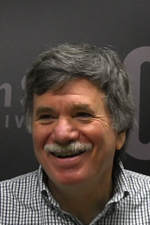Abstract

“Engineering Solutions for the Environment”
February 22, 2017
Location: Valley Library, Oregon State University. Watch Video | Download Transcript (PDF)
In the interview, Semprini discusses his Italian family heritage and his upbringing in Connecticut, touching upon his interests as a boy and his educational path growing up. He then describes his undergraduate experience at Worcester Polytechnic and the circumstances that led him to transfer to UC - Berkeley, where he studied Chemical Engineering. From there, he outlines his years working at Pacific Gas & Electric as a chemical researcher; notes the emergence of his interest in environmental engineering; and details the studies that led to his earning three graduate degrees from Stanford University.
Next, Semprini reflects on his years as a research associate at Stanford, describing a variety of research projects with which he was engaged, including important work focusing on in situ clean-up of areas contaminated by a commonly used degreaser, trichloroethylene. Semprini also comments on the evolution of his own environmental consciousness during his years at Stanford and the political hurdles that have frequently hampered academics working in the environmental sciences.
The interview then turns its attention to Semprini's years at Oregon State University, beginning with the circumstances of his move from Stanford and his early impressions of the university and the College of Engineering. In thinking back on his career at OSU, Semprini discusses his involvement in helping to create a distinct program in Environmental Engineering, and also speaks of several of the research programs that he has overseen. In particular, Semprini details his analyses of contaminants discovered in the Willamette River at Corvallis; a variety of subsurface clean-up projects conducted in collaboration with Stanford colleagues; and an investigation on the potential to convert methane into biofuels. Semprini also shares his thoughts on federal funding for science; his work as an administrator and teacher; and the continuing evolution of Environmental Engineering as a program at OSU. The interview concludes with a discussion of change within the College of Engineering and the outlook for OSU as it approaches its 150th anniversary.

